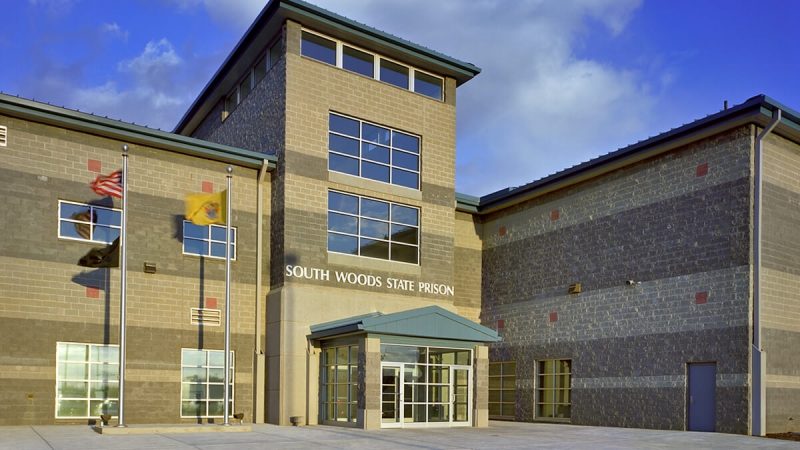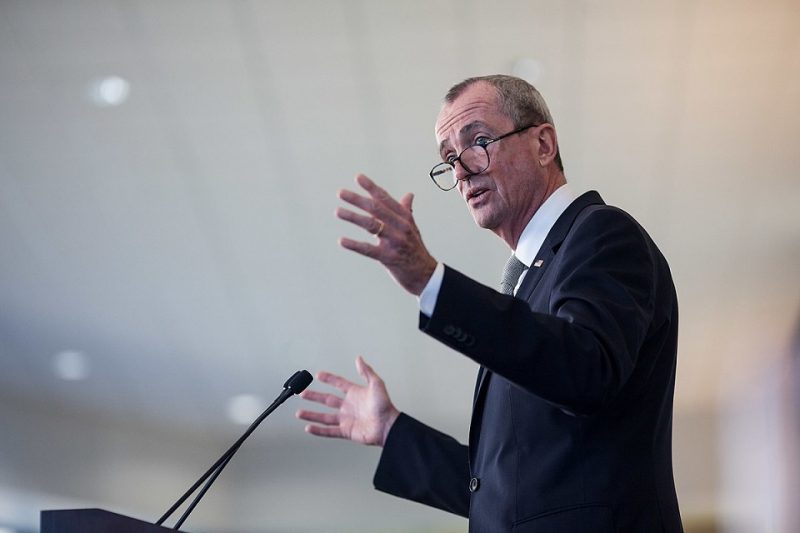Gov. Phil Murphy believes the state will be able to slow the spread of COVID-19 in the prison system by reducing the inmate population. (Courtesy Wiki Commons)
 By DONALD WITTKOWSKI
More than 2,000 inmates were released in New Jersey on Wednesday in an attempt to slow the spread of COVID-19 in the state prison system, but one state senator accused Gov. Phil Murphy’s administration of endangering the public by letting some “violent criminals” back on the streets.
Some of the prisoners have tested positive for the coronavirus, according to a New Jersey Department of Corrections internal memorandum that was publicly disclosed by state Sen. Michael Testa, a Republican representing Cape May and Cumberland counties and parts of Atlantic County.
“After all of the governor’s bloviating, this ‘knucklehead’ action by his administration is completely hypocritical and a clear threat to public safety,” Testa said in a press release.
In an interview Wednesday, Testa also criticized the Democratic governor for what he called the Murphy administration’s “utter lack of transparency” in allowing some inmates convicted of serious crimes – and others who have been infected with COVID-19 – to leave prison early.
“We’re talking about very violent criminals who have committed heinous crimes,” said Testa, noting that some inmates were serving sentences for aggravated assault.
Murphy signed legislation into law on Oct. 19 that reduces prison sentences for some inmates in response to the pandemic.
“Reducing our prison population will undoubtedly further our mission to combat COVID-19. This law further reduces the prison population to allow for even more social distancing,” Murphy said in a statement announcing the bill signing.
By DONALD WITTKOWSKI
More than 2,000 inmates were released in New Jersey on Wednesday in an attempt to slow the spread of COVID-19 in the state prison system, but one state senator accused Gov. Phil Murphy’s administration of endangering the public by letting some “violent criminals” back on the streets.
Some of the prisoners have tested positive for the coronavirus, according to a New Jersey Department of Corrections internal memorandum that was publicly disclosed by state Sen. Michael Testa, a Republican representing Cape May and Cumberland counties and parts of Atlantic County.
“After all of the governor’s bloviating, this ‘knucklehead’ action by his administration is completely hypocritical and a clear threat to public safety,” Testa said in a press release.
In an interview Wednesday, Testa also criticized the Democratic governor for what he called the Murphy administration’s “utter lack of transparency” in allowing some inmates convicted of serious crimes – and others who have been infected with COVID-19 – to leave prison early.
“We’re talking about very violent criminals who have committed heinous crimes,” said Testa, noting that some inmates were serving sentences for aggravated assault.
Murphy signed legislation into law on Oct. 19 that reduces prison sentences for some inmates in response to the pandemic.
“Reducing our prison population will undoubtedly further our mission to combat COVID-19. This law further reduces the prison population to allow for even more social distancing,” Murphy said in a statement announcing the bill signing.
 Gov. Phil Murphy believes the state will be able to slow the spread of COVID-19 in the prison system by reducing the inmate population. (Courtesy Wiki Commons)
New Jersey has the highest rate of inmate deaths due to COVID-19 in the nation and also one of the highest rates of infection among those incarcerated, according to state officials.
As part of the program to slow the spread of infection in the prison population, the state released about 2,261 inmates Wednesday who were nearing the end of their sentences.
“The N.J. Department of Corrections is working with a variety of stakeholders and agencies to ensure this historic release is managed responsibly,” the department said in a statement.
Inmates with less than a year left on their sentences can have up to eight months knocked off. However, anyone convicted of murder or aggravated sexual assault or whose conduct “is characterized by a pattern of repetitive, compulsive behavior” isn’t eligible for early release.
According to the new law, the state is required to release eligible inmates whether or not they have tested positive for the coronavirus. Testa said he understood that 11 of the inmates released Wednesday had tested positive.
Testa expressed fear that the release of COVID-19 inmates could turn into a “super-spreader” event for the virus. In another shot at the governor, Testa said the inmates were being given “COVID credits” by the Murphy administration to get out of prison early.
“I absolutely shudder to think what might have happened if we hadn’t blown the lid off this,” he said of his release of the Department of Corrections internal memo.
According to Testa, the memo details how inmates will be released at transportation hubs across the state, “where they’ll board trains and buses with unsuspecting passengers and employees who won’t realize they’ve been exposed to the coronavirus.”
“Instead of being forced to quarantine like everyone else, those sick inmates will have the opportunity to be super spreaders of the coronavirus all over New Jersey with bus and train tickets paid for by Governor Murphy,” Testa said in his press release.
Gov. Phil Murphy believes the state will be able to slow the spread of COVID-19 in the prison system by reducing the inmate population. (Courtesy Wiki Commons)
New Jersey has the highest rate of inmate deaths due to COVID-19 in the nation and also one of the highest rates of infection among those incarcerated, according to state officials.
As part of the program to slow the spread of infection in the prison population, the state released about 2,261 inmates Wednesday who were nearing the end of their sentences.
“The N.J. Department of Corrections is working with a variety of stakeholders and agencies to ensure this historic release is managed responsibly,” the department said in a statement.
Inmates with less than a year left on their sentences can have up to eight months knocked off. However, anyone convicted of murder or aggravated sexual assault or whose conduct “is characterized by a pattern of repetitive, compulsive behavior” isn’t eligible for early release.
According to the new law, the state is required to release eligible inmates whether or not they have tested positive for the coronavirus. Testa said he understood that 11 of the inmates released Wednesday had tested positive.
Testa expressed fear that the release of COVID-19 inmates could turn into a “super-spreader” event for the virus. In another shot at the governor, Testa said the inmates were being given “COVID credits” by the Murphy administration to get out of prison early.
“I absolutely shudder to think what might have happened if we hadn’t blown the lid off this,” he said of his release of the Department of Corrections internal memo.
According to Testa, the memo details how inmates will be released at transportation hubs across the state, “where they’ll board trains and buses with unsuspecting passengers and employees who won’t realize they’ve been exposed to the coronavirus.”
“Instead of being forced to quarantine like everyone else, those sick inmates will have the opportunity to be super spreaders of the coronavirus all over New Jersey with bus and train tickets paid for by Governor Murphy,” Testa said in his press release.
 State Sen. Michael Testa is worried that the release of COVID-infected inmates could turn into a "super-spreader" event in the public.
Of the 2,261 inmates who were released, about 1,265 came from Southern State Correctional Facility, Bayside State Prison and South Woods State Prison in Cumberland County, the Department of Corrections said.
“Of the individuals being released from those facilities, none are COVID-19 positive. Typically, individuals return to the community where they resided pre-incarceration, while some opt for a fresh start elsewhere; so just because an individual is released in a given county, it does not mean that individual will stay there post-release,” the department said in its statement.
Testa, whose First Legislative District includes Bridgeton and Vineland in Cumberland County, said inmates were given bus tickets to use the transportation centers in both of those towns. He said it’s not clear whether the inmates will stay in Cumberland County or head to other areas.
“There’s really no way to know,” he said.
State Sen. Michael Testa is worried that the release of COVID-infected inmates could turn into a "super-spreader" event in the public.
Of the 2,261 inmates who were released, about 1,265 came from Southern State Correctional Facility, Bayside State Prison and South Woods State Prison in Cumberland County, the Department of Corrections said.
“Of the individuals being released from those facilities, none are COVID-19 positive. Typically, individuals return to the community where they resided pre-incarceration, while some opt for a fresh start elsewhere; so just because an individual is released in a given county, it does not mean that individual will stay there post-release,” the department said in its statement.
Testa, whose First Legislative District includes Bridgeton and Vineland in Cumberland County, said inmates were given bus tickets to use the transportation centers in both of those towns. He said it’s not clear whether the inmates will stay in Cumberland County or head to other areas.
“There’s really no way to know,” he said.